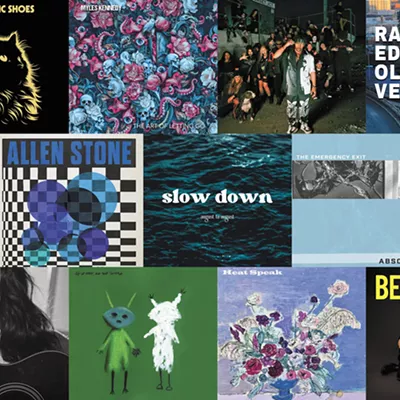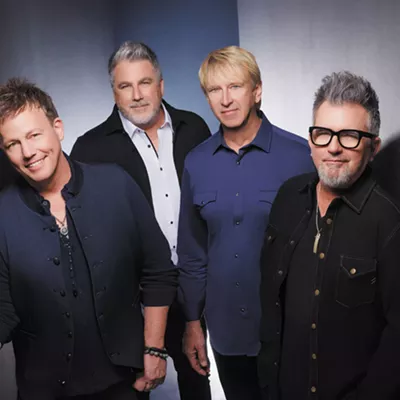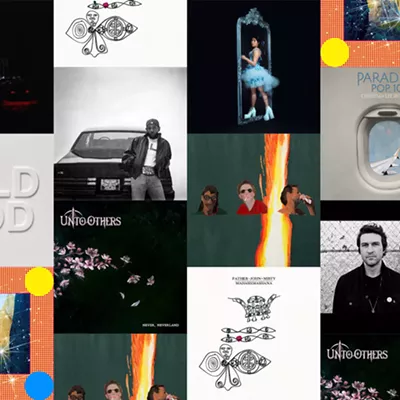Jim Boyd always looks so stoic and stern in his promotional photos. But let me tell you, that gruff exterior is only there for the benefit of the camera eye.
With even the slightest of human interaction, with nothing more than a simple "hello," the gruffness melts away.
Boyd's warmth and humor is the first thing you notice about him. The second thing that comes across is the way he's able to draw an audience in and hold them spellbound with nothing more than a guitar and a voice. Jim Boyd, together with a number of his musical friends, will be stopping at the Met this Friday evening for a concert performance featuring material from his latest album, Going to the Stick Games.
Boyd is a member of the Lakes band on the Colville Indian Reservation. He grew up on the rez and on various Air Force bases around the country. As a teen, he taught himself to play guitar. As a young man, he worked in construction but lived for the nights when he would go out and perform with various cover bands around the reservation. Back then, the idea of a serious musical career was much more than a passing thought.
"I was coming from really low self-esteem," says Boyd. "And not thinking that anybody would have an interest in anything I had to say."
He battled his demons on his own for years before finding (with help from friends like writer Sherman Alexie) the strong and focused inner voice he needed to carve out a career writing and performing his own music. Today he's on an upward trajectory, with a seven-album discography, performances all over the world and three Native American Music Awards under his belt. Though his performance schedule frequently takes him far from the Inland Northwest (is Switzerland far enough for ya?), Boyd considers Inchelium home and maintains his Thunderwolf Records recording studio there.
"Sometimes I think I've been at this way too long," he laughs. "And it gets overwhelming at times. But I put myself in that position so there's no one else to blame. I love it, or I wouldn't do it."
Boyd's new album, Going to the Stick Games, was recorded locally by Robert Hartwig at Black Coffee Studios with a little help from friends, including longtime collaborator Alfonso Kolb (percussion), Pam and Lori Ludwig (vocals), John Bole (banjo), Brad Greene (piano) and Beth Bramhall (accordion). The album alludes to a traditional game played by many Northwest tribes: a game of chance that was once used as an icebreaker among the gathering tribes. The stick games are still played today. Woven into the process of the games are the stick game songs, which are used by each team to distract the other and to pump up their own team during the contests. Going to the Stick Games is dedicated to those songs -- and to the people who keep this tradition alive.
Shearwater's Good Deed -- "A Shearwater is an ubiquitous, unimpressive-looking gray bird that floats on and flies over the sea," says guitarist Will Sheff, who is also a songwriter and founding member of Shearwater, the darkly emotive Austin, Texas, outfit. The band -- which also includes vocalist/keyboardist Jonathan Meiburg, upright bassist Kim Burke and drummer Thor Harris -- will be making a visit to the Shop Monday night.
Shearwater deals in a brand of haunting, fragile folk fleshed out with deep atmospherics. The group first appeared on the radar screen sometime in the year 2000. Sheff says that singer/songwriter Meiburg, an ornithologist and bird-obsessive -- he's nothing less than the world's authority on the on the South American striated caracara -- came up with the name.
"I was playing in a band called Okkervil River and had some songs that wouldn't fit the style of the band," Sheff explains. "Jonathan was playing in a band called Kingfisher, or Fisher King, or Whu Gnu, or Walking Spanish, or the Bowlers, and they had other concerns besides which weepy ode to death to learn next."
The two began writing songs together, mostly by e-mail.
"We had just planned to record them on a four-track, but then four-track turned into studio because a friend of ours needed to do a project that he liked after months and months of blues-rock combos."
The first recording sessions were lackadaisical affairs with musician friends rotating in and out of the studio, adding parts -- pedal steel, violin, cello -- here and there. Yet after just three days, Meiburg and Sheff walked out with an impressive handful of digital tapes.
"We liked those tapes so much we decided to finish and master the record and make our band official," says Sheff.
The Dissolving Room was the result of those sessions (Sheff irreverently describes it as being "both crushingly depressing and boring enough so that you fall asleep before you kill yourself"). It was followed by 2002's Everybody Makes Mistakes. On Winged Life (the band's latest album on Misra Records), Shearwater explores more fully realized compositions while staying true to the band's original sonic and thematic heading.
Echoes of Neil Young and Leonard Cohen can be heard within these slightly deranged ballads and low, rumbling rockers. The harrowing love stories in the grooves are translated with the aid of Meiburg's trembling, mournful, echo-y vocals. On "My Good Deed," the song's protagonist falls into the familiar trap of thinking he has the power to save another -- even believing that he should try to exert that power -- with predictably disappointing results. Meanwhile, the multitude of instruments on Winged Life submerge and surface like apples in the muddy waters of a meandering old river. There's fluidity and method to their movements, with guitars, vibraphone, upright bass, percussion, banjo and Hammond organ all vying for time but never intruding on one another. Instead, they blend, take turns or retreat.
It's a warming soundtrack for cool, wet days, perhaps even -- in spite of Sheff's self-deprecating comments -- a life preserver in angry waters. -- Mike Corrigan
Big Dipper Thursdays -- One venue opens and another one closes -- that really seems to be the mantra for Spokane's all-ages music scene. So as we bid a final farewell to the short life of the Detour, we see another venue open up not far from there. This time, it's the Big Dipper -- a venue that's flickered on the all-ages spectrum over the years.
As a part of the Dipper's plan to be another spot where local bands can plug in and pump out the jams, a coffeehouse-style night will be hosted each week on Thursday nights. The weekly event is the result of a partnership between the Dipper, RAWK the Inland Northwest, TINCAN and the Chase Youth Commission. And here's the best part: It's all free.
Thursday nights, says Dale Strom of RAWK, "are meant to provide something new in the music scene here. We'd rather not charge the cover charge, because then kids would have a place to go for free."
In fact, in order for bands to play the Thursday night teen-oriented event, they have to shell out 50 bucks, which goes toward covering the costs of the event. Bands can't make money off the night unless they sell merchandise -- which they are free to do.
"We think it's worth it to the bands," Strom says. "There are a lot of bands out there that aren't that well-known, and they need the exposure. They are renting the room -- but they are renting the crowd, too, because we promote this on a weekly basis."
Strom points out that Thursday nights are intended to have more of a local focus, but to celebrate the beginning of the weekly music event, RAWK and the other sponsoring groups are bringing in four national touring acts.
Next Thursday, Oct. 28, the Dipper will host Armor for Sleep with Days Away, Number One Fan and The Snake The Cross The Crown opening. The members of Armor for Sleep, a four-piece New Jersey emo "dream rock" band, describe their sound as reminiscent of early Sunny Day Real Estate. Their songs are catchy and infectious, they say, without making their music poppy or generic. Armor for Sleep was born after singer Ben Jorgenson spent a summer of isolation between his last year in high school and his first year of college. He wrote and recorded two songs on his own -- even being so ambitious as to play all of the instruments. He wanted to continue recording, but he knew he couldn't do it alone. That's when two of his cousins (drummer Nash Breen and guitarist PJ DeCicco) and a friend came in. A deal came quickly with Equal Vision Records of Albany, N.Y., and the band's debut, Dream to Make Believe came out in 2002.
Armor for Sleep's gig at the Big Dipper was spur-of-the-moment, Strom says, but he thinks it's a great way to kick off the Thursday night events.
"This was an opportunity to make a big splash -- because this is an outstanding show," he says.
Strom and his cohorts are just hoping that the splash is big enough to keep the Big Dipper's light shining on the Spokane scene. -- Leah Sottile
Publication date: 10/21/04















